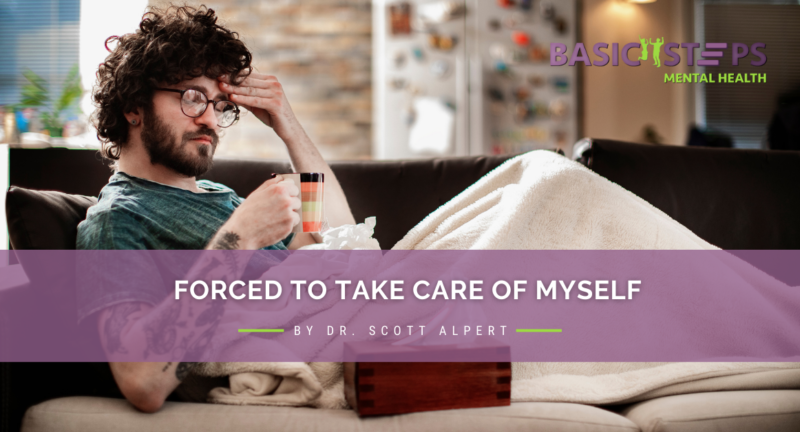
Self Care
Most people think of self-care as taking care of our physical body. The focus is mainly on getting enough exercise, eating the perfect diet, and going for a treatment at the spa. Well, yes, this is a portion of self-care but it is not the full picture. To ultimately take care of ourselves we have to consider our whole self. This was news to me when I entered graduate school. I was so focused on working out that my body was in shape, but why was I a nervous wreck?
When caring for yourself it is important to take into account all of you – your physical, mental, emotional, and spirit. If not, we create an internal imbalance.
Imagine Stuart. Stuart has been using alcohol daily for 10 years. He wants to stop because of his deteriorating health and relationships and decided to slowly cut down to avoid detoxing.
Let’s map this out on a scale from 1 – 10 where 10 means he is at his optimum.
Stuart registers this way:
Physically = He is at a 4
Mentally = He comes in at a 5 where half his thoughts are positive.
Emotionally = He is at a 3. Stuart has a poor relationship with himself and numbs out his feelings.
The Spiritual has no plus or minus, it is just a core state of feeling joy, intuition, and forgiveness of self.
As Stuart stops drinking, his focus has been on proper diet and exercise. As a result, his physical body improves but the others are still lacking. Now he rates as the following:
Physically = 7
Mentally = 3
Emotionally = 2
Spiritual (no score)
Because his underlying mental and emotional levels are not being addressed, it puts extra strain on him, and he gets bombarded with negative thoughts and shame. Suddenly hidden memories begin to surface that are disturbing and the likelihood of relapse is extremely high.
This is a common story for people who are trying to change a bad habit. The key to change is in addressing all of the levels to increase our odds of success.
A friend went on the Dr. Phil show to lose weight. He was well over 300 pounds and had tried all the diets but was offered this opportunity and took it. So, in front of a national audience, he lost all the weight and returned to the show for the success report. Dr. Phil asked him how he felt. Being honest, he stated he was sad. He realized he had turned to food to soothe his feelings of unworthiness and no longer had that crutch. Dr. Phil asked him what would make him feel better and he stated he had never been in a relationship. Dr. Phil made him go to a nearby bar, with the film crew following him, was given an earpiece, and Dr. Phil talked him through the process.
It was humiliating as he went on a mandated search for a potential mate because he had no experience with women. One by one he approached woman after woman and asked them to go out on a date. One woman felt sorry for my friend and agreed to go out on a date. (I think they actually bribed her). When they met for the date it became so uncomfortable for him that he fell into a dark depression and gained all the weight back. When we don’t care for our whole self, relapse takes place.
To ensure our odds of healing and changing, nurturing our entire self is key. Here are the bare basics:
Physically – here are some less obvious elements.
- Proper rest and relaxation – Get a minimum of 7 hours of restful sleep.
- Massage – Bodywork is key to working things out of our tissues.
- Acupuncture – This helps the body’s energetic system improve.
- Supplements – Get a blood test and see what supplements the body is lacking.
Mentally –
- Replace negatives with positives.
- Learn from your mistakes and live life in this new and improved way of thinking.
- Intention setting – Here is where you focus on what you do want, and step toward it. Follow this format: “My intention is…”
For example: “My intention is to be sober.” Or “My intention is to be gentle with myself.”
When creating intentions, keep them in the positive. Avoid – “My intention is not to be negative.” Here, the subconscious mind doesn’t hear the not, but focuses on negativity.
Emotionally – The language of the emotions is very different. It is a feeling state therefore you must focus on your relationship with you. It is important to understand that people pleasing is discouraged because it gives the innermost part of you the meta-message that others are more important. Learn how to have your own back and pull from within whenever the chips are down.
Here are the basic emotional tools:
- Reparenting – Here is where you literally help yourself re-grow up. If you’ve experienced trauma in your past, create a great relationship with the part of you that went through that experience. Otherwise, under stress, the tendency is to revert to that age stage and feel hopeless and stuck. In supporting your younger self through difficult situations, we bond with ourselves and that makes it easier to bond with others.
Note: We are only as strong as our emotional makeup. In learning how to love and support yourself it is the greatest self-care you can do.
- Opposite hand writing (OHW) – On paper have a conversation with your younger self. OHW also works great with talking to depression or cravings. Your dominant hand represents the current you and the opposite hand represents your younger self, emotions, or cravings.
Example:
Dominant hand: Addict me I am upset with you.
Opposite hand: Why? I make you feel good and confident, and I help you deal with social anxiety.
Dominant hand: You are not making me feel good anymore. You are ruining my relationships, and my health, and because of you, I may lose my job and marriage.
Let this conversation work its way out and stay strong until an inner agreement can be found. OHW needs to be a daily part of ultimate self-care.
- Free-form writing – put pen to paper and write out all your thoughts. It is natural to have rambling thoughts in your head when you are changing. Write out thoughts and feelings and then discard them. Avoid rereading it. Simply let it go.
Spiritually –
- Visualization and meditation – Visualize yourself being successful in your life. Picture yourself sober and happy.
- Prayer – Ask for divine intervention.
- Forgiveness of self – Once you learn a lesson, let go of your identity with being that way. After learning the lesson, you can set the intention to live more functionally from now on.
- Self-Praise – Appreciate your own efforts. In telling yourself that you are proud of what you did it can motivate you to take just one more step forward when you feel like giving up.
These are simply the basic basics. The mere fact that you are reading this to the end shows that you are involved in your life and want to get better. Please give yourself the opportunity to grow and experience life as you wish it were.
Compassionate Care is Always Available
There are many more tools and strategies you can use in your pursuit of happiness. Here is where we come in. Contact us at Basic Steps Mental Health and let us support and educate you on this journey back to your loving heart center. Imagine living a heart-centered life, regardless of what is happening externally. We’d love to be of help.
For 25 years, Dr. Scott Alpert, the clinical director of Basic Steps Mental Health, has treated over 7,000 people with mental health and addiction problems, using a Psychological approach that mixes and matches ten of the top approaches used in the industry. We are here virtually and in-person to help you get through this COVID-19 pandemic and many other difficulties you may be experiencing.
May you have good mental health.
Related Posts
What Is the Best Healing Strategy?
They gave us an assignment in graduate school to create our own healing...
Forced to Take Care of Myself
I am under the weather. Does the weather cast an evil spell, if so it got me. My...




